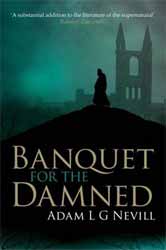|
Click here to return to the main site. Book Review
Elliot Coldwell was a Professor on a mission, a mission to contact the dead. To aid him in this endeavour he has enlisted the help of some of his students. However, things do not go as planned and it seems that the experiment is a failure. But appearances are often deceptive and unbeknownst to anyone something does cross over and one by one the students start to disappear... Banquet for the Damned is the not so new supernatural thriller from Adam L. G. Nevill. Originally published in a limited hardback run of 500, in 2004, the book is getting greater and more deserved exposure with this paperback release, which has seen some minor changes. The book's tone and construction follows in the English tradition of horror, rather than the American, so it is little wonder that Nevill admits to being influenced by M. R. James from an early age. Other influences have also crept in with Coldwell being portrayed as a very Crowley-esque character. The main protagonists of the book are Dante and Tom, two slightly less than successful Birmingham musicians, who decide to visit St Andrews in Scotland, where Coldwell now teaches. They are motivated having read Coldwell’s obscure and out of print tome Banquet for the Damned to seek out this mysterious figure. On the day of their arrival they quickly realise that things are not right, when body parts get washed up on a lonely beach. At the same time the night terrors, which are being suffered by a number of students, have also gained the attention of Hart Miller, an expert in this phenomenon. However, many of the students that he sees disappear. The novel's strength lies in its plot and the descriptive passages, which are sometimes Dickensian in length. This is great if you like this very literate style of writing and Nevill does an excellent job at evoking a sense of fear and dread. Personally, this means that parts of the book often feel like a style over content competition, with style the clear winner. That said, this is also a part of the tradition of English occult writers and both M. R. James and Dennis Wheatley were just as guilty of this. The characters, however, could have done with some more development; this is a minor quibble in what is otherwise a very well written and constructed occult thriller. 8 Charles Packer |
|---|


